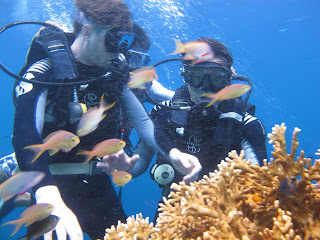 |
| Photo op with cast members of Oneri, a Korean play put on in Daejeon starring 작은 누나 in the title role. |
Are you living and working in another country? Why not make friends with the locals?
Foreign English teachers have told me that Koreans only want to practice English with their foreign friends. First off, that's not entirely true. Whenever Koreans have wanted to have conversation practice with me, they have made it very clear that was their intent. When my Korean friends just want to hang out, it's been obvious they wanted friendship. Also, what's wrong with having a conversation partner? I've done it before, and they are happy to speak Korean with you if you are interested.
 |
| Koon Hyeung and I scuba dive in Cebu |
 |
| Our school's samulnori team. Samulnori is a sitting percussive orchestra that uses four instruments: 꽹과리(kkwaenggwari), 징 (jing), and the drum section, 북 (buk) and 장구(janggu), |
I can't remember how many times my Nunim has invited me to play volleyball, eat samgyeopsal, play janggu, or come to Seocheon to visit her mentor's calligraphy studio to roast chestnuts, sing at noraebang and play billiards. The experiences I've had here will live with me to my grave.
Family and friends
가족 gajok (family)
Family and friends
A great subject to speak about with your new Korean friends is your family back home. Here are some useful words on the topic of family and friends. The first person
possessive pronouns are 제 (formal), pronounced chae and 내 (informal), pronounced neh. Use one of these possessive pronouns before the following words to describe your foreign or Korean friends and family. ex: "Chae gajok Canada issuh wassayo. Vancouver ariyo? Nae, Chae gajok haggo chae chingu Vancouver issuh wassayo." Or something like that.
제 가족
가족 gajok (family)
누님 nunim (sister
with children)
작은 누나 chak-eun nuna (second oldest sister)
형님 hyeong nim (older brother)
큰형 keun hyeong (elder
brother)
작은형 chak-eun hyeong (second
oldest brother)
막내 mag-neh (youngest
one)
여동생 yeo dongseng (younger
sister)
남동생 nam dongseng (younger brother)
오빠 oppa (woman's
older brother)
시누이 shinu-i (sister-in-law)
올케 olgeh (brother's
wife)
아버지abeoji (father)
어머니oemoeni (mother)
할아버지 haraboeji (grandfather)
할머니 halmoni (grandmother)
아줌마 ajumma (middle-aged
woman)
아저씨 ajeoshi (middle-aged
man)
애기 eh-gi (baby)
조카 joka (niece/nephew)
사촌 sa-chone (cousin)
삼촌 sam-chone (uncle)
이모 emo (mother'sister)
고모 komo (father's
sister)
친구 chingu (friend)
친한친구 chinhan chingu (best friend
여자 친구 yeoja chingu (girlfriend)
남자 친구 namja chingu (boyfriend)




0 Comments